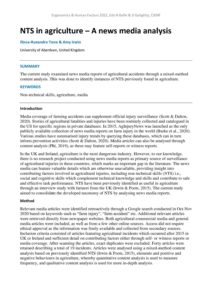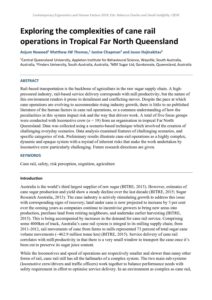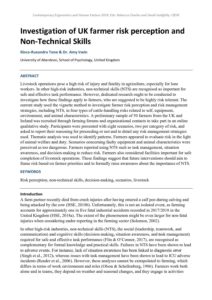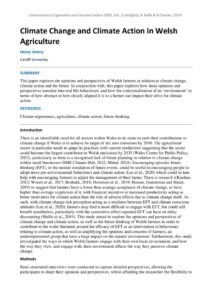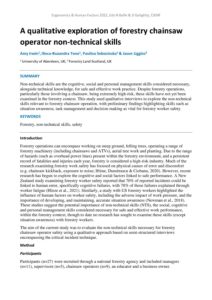Agriculture & forestry
NTS in agriculture – A news media analysis
| Document | Author Ilinca-Ruxandra Tone & Amy Irwin |
| Abstract The current study examined news media reports of agricultural accidents through a mixed-method content analysis. This was done to identify instances of NTS previously found in agriculture. |
Exploring the complexities of cane rail operations in Tropical Far North Queensland
| Document | Author Anjum Naweed, Matthew JW Thomas, Janine Chapman and Jason Hajinakitas |
| Abstract Rail-based transportation is the backbone of agriculture in the raw sugar supply chain. A high-pressured industry, rail-based service delivery corresponds with mill productivity, but the nature of this environment renders it prone to derailment and conflicting moves. Despite the pace at which cane operations are evolving to accommodate rising industry growth, there is little to no published literature of the human factors in cane rail operations, or a common understanding of how the peculiarities in this system impact risk and the way that drivers work. A total of five focus groups were conducted with locomotive crew (n = 19) from an organisation in tropical Far North Queensland. Data was collected using a scenario-based technique which involved the creation of challenging everyday scenarios. Data analysis examined features of challenging scenarios, and specific categories of risk. Preliminary results illustrate cane-rail operations as a highly complex, dynamic and opaque system with a myriad of inherent risks that make the work undertaken by locomotive crew particularly challenging. Future research directions are given. |
Investigation of UK farmer risk perception and Non-Technical Skills
| Document | Author Ilinca-Ruxandra Tone & Dr. Amy Irwin |
| Abstract Livestock operations pose a high risk of injury and fatality in agriculture, especially for lone workers. In other high-risk industries, non-technical skills (NTS) are recognised as important for safe and effective task performance. However, dedicated research ought to be conducted to investigate how these findings apply to farmers, who are suggested to be highly risk tolerant. The current study used the vignette method to investigate farmer risk perception and risk management strategies, including NTS, in four types of cattle-handling risks related to self, equipment, environment, and animal characteristics. A preliminary sample of 50 farmers from the UK and Ireland was recruited through farming forums and organisational contacts to take part in an online qualitative study. Participants were presented with eight scenarios, two per category of risk, and asked to report their reasoning for proceeding or not and to detail any risk management strategies used. Thematic analysis was used to identify patterns. Farmers appeared to evaluate risk in the light of animal welfare and duty. Scenarios concerning faulty equipment and animal characteristics were perceived as too dangerous. Farmers reported using NTS such as task management, situation awareness, and decision-making to reduce risk. Farmers also considered facilities important for safe completion of livestock operations. These findings suggest that future interventions should aim to frame risk based on farmer priorities and to formally raise awareness about the importance of NTS. |
Climate Change and Climate Action in Welsh Agriculture
| Document | Author Henry Amery |
| Abstract This paper explores the opinions and perspectives of Welsh farmers in relation to climate change, climate action and the future. In conjunction with, this paper explores how these opinions and perspectives translate into real life behaviours, and how the contextualisation of an ‘environment’ in terms of how abstract or how closely aligned it is to a farmer can impact their drive for climate action. |
A qualitative exploration of forestry chainsaw operator non-technical skills
| Document | Author Amy Irwin1, Ilinca-Ruxandra Tone, Paulina Sobocinska & Jason Liggins |
| Abstract Non-technical skills are the cognitive, social and personal management skills considered necessary, alongside technical knowledge, for safe and effective work practice. Despite forestry operations, particularly those involving a chainsaw, being extremely high-risk, these skills have not yet been examined in the forestry context. This study used qualitative interviews to explore the non-technical skills relevant to forestry chainsaw operation, with preliminary findings highlighting skills such as situation awareness, task management and decision-making as vital for forestry worker safety. |

